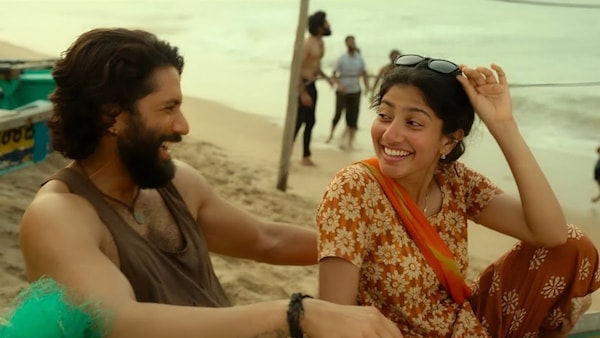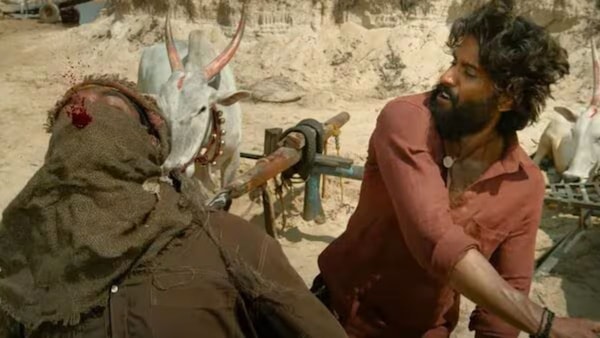Thandel Is A Dry & Dated Melodrama
Naga Chaitanya and Sai Pallavi starrer Thandel is the best bad film in all the oldest ways possible. Apart from Pallavi, everyone and everything is artificial including the filmmaking.

Promo poster for Thandel.
Last Updated: 08.26 PM, Feb 07, 2025
IN CHANDOO MONDETI'S Thandel, distance makes romance sing harder before it combusts into a residue of tears. Raju (Naga Chaitanya) and Satya (Sai Pallavi) have been together since childhood and now their love blossoms through the stray mobile tower. Raju is a seafarer, a fisherman who works the waters around Gujarat while Satya in Srikakulam looks longingly at her mobile phone to hear a syllable in his voice. He holds the phone aloft and so does she at home. He, with ocean on all sides and, she, on land but not far from the beach. We see a fisherfolk community that toils in the waters, the men away for long and the women waiting and working at home. We know that this frequent separation will not end well and as expected, Thandel doesn’t hold its cards too close to its chest. It presents everything without a facade.
Raju is our regular Telugu film hero, and this is as mainstream as it gets so he is introduced romancing and fighting at the same time. The first half coasts along and nothing really happens for much of Thandel’s runtime. Physical distance gives way to emotional distance between the lovers but the way the film narrativises these events is toothless. The film places itself in melodramatic territory, the star-crossed lovers’ separation is the whole point, but the writing is flat and we never feel for any of these people. Apart from Sai Pallavi, everyone and everything is artificial including the filmmaking. It is probably forgivable to use a green screen for scenes atop a lighthouse, but Satya is staged in front of what looks like a green screen even for a scene on the terrace of her tiny dwelling. The film looks cheap and when even basic scenes are given this little attention then what to make of stormy seas where there are both fights as well as lifesaving action.

Thandel, therefore, looks dated and the emotional hooks too are as old as cinema itself. This is not a sin. It can still work today if done well but the film lacks conviction in presenting its story, it is all without passion and heat. The second half of the film is inspired by the true story of Chodipilli Musalayya and fellow fishermen who inadvertently crossed the border off Gujarat into the waters of Pakistan. They spent over a year in prison before returning to India. Raju, who is now the thandel/anchor/leader of his gang, has all the opportunities to flex muscles inside the prison in Karachi. And Mondeti gets all the freedom to flex his jingoistic ideas. Except for one senior jailer played by Prakash Belawadi, every Muslim man is demonised. There is a thank you card for the late Sushma Swaraj, the former BJP leader and central minister. The film makes use of her history as External Affairs minister even though the real story occurred in 2000.
Thandel has everything the new India with hyper fixations of Hindu imagery in cinema would like. Though this is nothing new in Telugu cinema, there is a song on Lord Siva, Raju’s boat bears the name Durga, and a huge Siva lingam shrine becomes Raju and Satya’s regular haunt, second only to the lighthouse. In the name of boosting the film with some adrenaline, Mondeti sprinkles on some casual Islamophobia along with real-world events like the repealing of Article 370 in 2019. It is also around the time Swaraj passed away, so it gives him a reason to prolong Raju and his friends’ misery in Pakistan. Her name is changed to Sushila, but we see her photograph (due to weird censor board rules around this) and for utterly no reason, Sai Pallavi offers unnecessary adoration and condolences at the frame.

By this point, we have forgotten that Raju and Satya had anything going at all between them. The romance is now cold, the film loses whatever grip it had over a story, and becomes something of a one-woman show, Sai Pallavi, protesting, standing outside ministries and doing everything she can to bring the people of her community home. It is frankly pathetic how Thandel uses and twists some real-world events to suit the film and its agenda. If the filmmaking looks cheap with all that green screen, the writing is worse with subplots involving urinating over words and flags and forced circumcision. Apparently, no one cares that a child is in the same prison as all the adults. But then the film doesn’t care that everyone from people in Gujarat to Karachi speaks in Telugu. Thandel is the best bad film in all the oldest ways possible.

 Premium
Premium